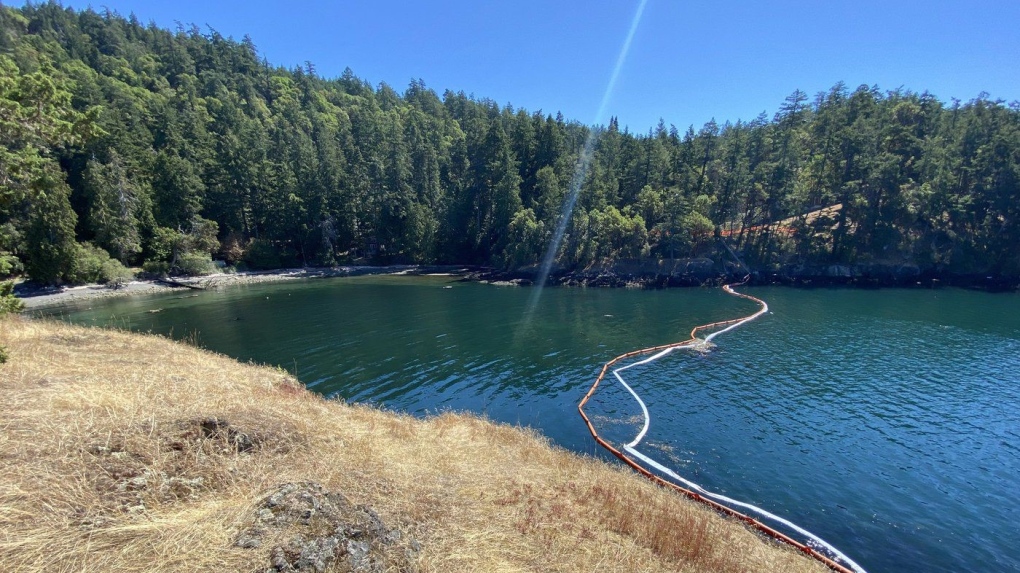Sheen dissipates but sunken U.S. fish boat still in orca habitat east of Victoria
 A boom protects a sensitive area on San Juan Island, Washington, in this Aug. 16, 2022, handout photo. (THE CANADIAN PRESS/HO - U.S. Coast Guard)
A boom protects a sensitive area on San Juan Island, Washington, in this Aug. 16, 2022, handout photo. (THE CANADIAN PRESS/HO - U.S. Coast Guard)
The United States Department of Ecology says an oil sheen from a sunken fish boat appears to have completely dissipated from an area of U.S. waters just east of Vancouver Island.
The update comes as the U.S. Coast Guard and other agencies work to recover the 15-metre Aleutian Isle that went down Saturday with about 10,000 litres of oil and diesel aboard.
Five crew members were saved, but the vessel now lies in roughly 60 metres of water near San Juan Island in Haro Strait, about 25 kilometres east of Victoria.
The statement from the Department of Ecology says no oil residue has been found on the Island and measures are being used to deter any whales from venturing near the wreck, which is in a key feeding ground for critically endangered southern resident orcas.
One large seine net that floated free of the fish boat was recovered Tuesday and divers also pulled up several panels of a second net that was floating in about 30 metres of water.
The depth of the Aleutian Isle is complicating efforts to examine it before the remaining fuel can be drained or the ship can be salvaged, and officials say there is currently no timeline for any of that work.
This report by The Canadian Press was first published Aug. 17, 2022.
CTVNews.ca Top Stories

Budget 2024 prioritizes housing while taxing highest earners, deficit projected at $39.8B
In an effort to level the playing field for young people, in the 2024 federal budget, the government is targeting Canada's highest earners with new taxes in order to help offset billions in new spending to enhance the country's housing supply and social supports.
BUDGET 2024 Feds cutting 5,000 public service jobs, looking to turn underused buildings into housing
Five thousand public service jobs will be cut over the next four years, while underused federal office buildings, Canada Post properties and the National Defence Medical Centre in Ottawa could be turned into new housing units, as the federal government looks to find billions of dollars in savings and boost the country's housing portfolio.
Some of the winners and losers in the 2024 federal budget
With a variety of fiscal and policy measures announced in the federal budget, winners include small businesses and fintech companies while losers include the tobacco industry and Canadian pension funds.
From housing initiatives to a disability benefit, how the federal budget impacts you
From plans to boost new housing stock, encourage small businesses, and increase taxes on Canada’s top-earners, CTVNews.ca has sifted through the 416-page budget to find out what will make the biggest difference to your pocketbook.
Police to announce arrests in Toronto Pearson airport gold heist
Police say that arrests have been made in connection with a $20-million gold heist at Toronto Pearson International Airport one year ago.
Teen hockey players arrested for sexual assault following hazing incident: Manitoba RCMP
Three teenagers were arrested in connection with a pair of alleged hazing incidents on a Manitoba hockey team, police say.
'I Google': Why phonebooks are becoming obsolete
Phonebooks have been in circulation since the 19th century. These days, in this high-tech digital world, if someone needs a phone number, 'I Google,' said Bridgewater, N.S. resident Wayne Desouza.
Liberals aim to hit the brakes on car theft with new criminal offences
The Liberals are proposing new charges for the use of violence while stealing a vehicle and for links to organized crime, as well as laundering money for the benefit of a criminal organization.
BUDGET 2024 Ottawa police get $50 million to boost security around Parliamentary Precinct
The Ottawa Police Service will receive $50 million in new federal funding over the next five years to "enhance security" around the Parliamentary Precinct.































